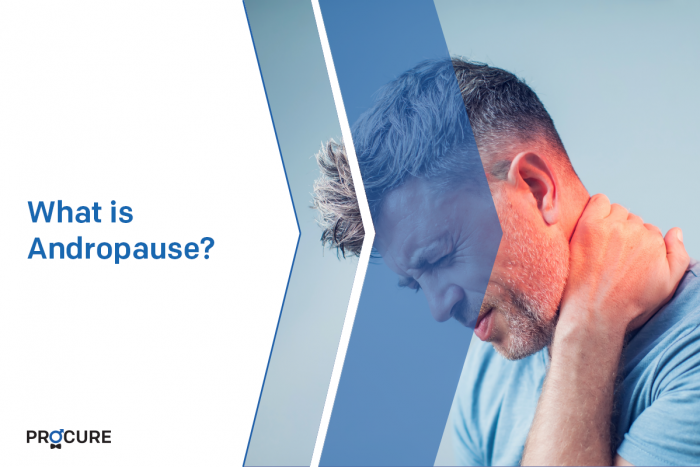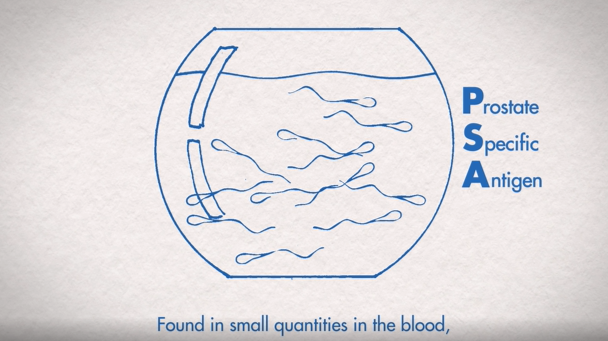According to the Quebec Association of Endocrinologists (AMEQ), the terms “andropause” and “menopause in men” are not adequate. Menopause is the cessation of menstrual cycles occurring in all women. Therefore, what is Andropause?
Testosterone levels in humans do not decrease suddenly, but rather gradually as they age. Not all men will experience a significant decrease in testosterone with age. The assessment and treatment of hormonal changes in men and women should be diagnosed and treated differently.
Commonly known as male menopause or andropause, the drop in testosterone over the years is often seen as the male counterpart of menopause in women. However, this comparison is rather lame and differs from female menopause in several respects. On the one hand, and unlike menopause, when hormone production stops completely, the decline in testosterone is a gradual process over several decades. Testosterone levels start to drop from the age of 30, by around 1% per year. On the other hand, despite this drop in testosterone which leads to specific symptoms, the reproductive system is not affected, and sperm production remains possible while female menopause marks the end of the female reproductive cycle.
However, men experience a range of symptoms and changes as they age, which some people compare to the effects of menopause.
So, what is the best way to talk about the so-called male menopause?
Many doctors use the term “andropause” to describe the hormonal changes associated with aging in men. Other terms include testosterone deficiency syndrome, androgen deficiency in aging men and late male hypogonadism. Affected men are usually affected from around 45 years of age and the severe drop in testosterone can lead to physical and psychological symptoms.
The possible symptoms of testosterone deficiency according to the Association of endocrinologists of Quebec (AMEQ) are…
- Mood changes and poor concentration
- Little energy
- Decreased muscle strength and endurance
- Increase in body fat
- Decreased libido (sexual desire)
- Difficulty getting and maintaining an erection
- Decreased growth of beard and hair
- Breast development
- Hot flushes
- Osteoporosis (brittle bones)
Can andropause be treated?
Many of the symptoms associated with andropause may be related to normal aging or may be caused by another disease. Therefore, in addition to the physical exam and the appropriate questionnaire, your doctor will perform blood tests and various tests to determine the disorder (or invalidate it.)
If your testosterone level is indeed very low, your doctor may prescribe hormone treatment, such as testosterone, either by capsules, injections, patches or body gel. However, this treatment is not for everyone: it remains contraindicated in all patients with prostate cancer, for example. If your doctor suggests this type of treatment, take the time to weigh the pros and cons before making your decision.
To help manage some of your symptoms, your doctor may also recommend lifestyle changes, such as an exercise program combined with a healthy diet, and if necessary, prescribe medication such as an antidepressant, if there is depression.
One thing is for sure, you should never diagnose yourself and surf the internet to buy testosterone supplements. The effects could be devastating for your health. When in doubt, please consult!
Discover our new animated videos
Discover three new animated videos, each equally unique and original from one to the other. Be on the lookout!
Here is the first one – Symptoms, Risk and Screening
Take the time to visit each of our pages on this website, as well as our YouTube channel, in order to get familiar with the disease with our expert lectures, our section on available resources, the support that is offered to you.
Do you have any questions or concerns? Above all, do not hesitate. Contact us at 1 855 899-2873 to discuss with a nurse specializing in uro-oncology. It’s simple and free, like all our services.
Pages of our site that might interest you
Want to know more? Just click on one of the links below.
Nutrition and Healthy Weight
Can we prevent cancer?
Diseases related to the prostate
The latest PROCURE news that might interest you
Every week we publish a blog article. Here are some we chose for you.
Men’s Health – 10 Mistakes Not To Do
6 Tips To Keep Your Prostate Healthy
What Your Urine Can Tell You
Sources et references
Quebec Association of Endocrinologists (AMEQ)
Written by PROCURE. © All rights reserved – 2020



 ADDITIONAL RESOURCES
ADDITIONAL RESOURCES


